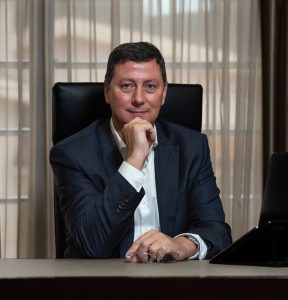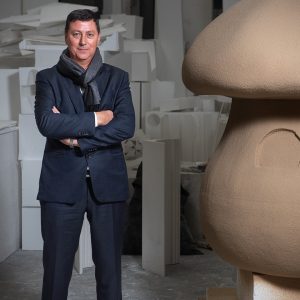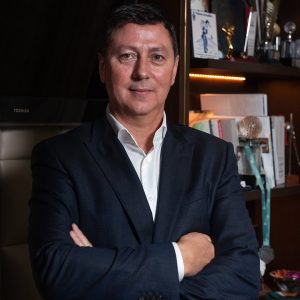Rigor is engraved in his personality. Audacity, in the enthusiasm he devotes to each project. And success can be seen in the soul matrix of everything he has created. The struggles, the problems, the doubts, the difficult decisions, the sleepless nights. There was no shortage of reasons to deter Tomás Barbosa from transforming Engimov into what it is today - one of the most renowned construction companies at national and international level. But no. History was made of sweat and determination. Wherever he saw opportunity, he took it. At a young age, he left school to work with his parents. This was followed by a flying start in France. Shortly afterwards, another leap to Canada. And what an adventure it was. There he set up his first company and won. But it was in Portugal, in his hometown of Braga, that he truly experienced the great challenges of construction. Years of struggle and persistence. Years of achievement. He has traveled to the four corners of the world and planted his various companies there. He has seen them grow every year of his work. Today, 16 years on, Engimov is a solid company. Tomás Barbosa is proud of his journey without taking his eyes off the horizon. Or he wouldn't be a full-time dream-builder.
Tomás's story is one of a long road of challenges and triumphs. How did it all begin?
I was very young, I left prep school and went to work with my parents until I was 17. Then I went to France with my brother-in-law. I worked with him for six months. I came back from there and my sister (Belmira) had bought a ticket for one of my brothers to go to Canada for Christmas. He didn't want to go. So I took advantage of the ticket and went myself. I ended up staying there for three years, without coming here. It was hard, very hard, but I managed. After those three years, I came to Portugal for 15 days and returned to Canada, where I started a family (I had three children, Christopher, Maegan and Ashley), and worked for another 12 years.
Was it 15 years in Canada?
Yes, in those 15 years, I tried to start a company in Toronto. I formed a partnership with a friend. We had the company for three years, but with the financial crisis in the 1990s, we had to stop. I went back to work for my old boss. Towards the end of those 15 years, I started looking at Portugal. A lot because of the development that was going on here. And also because my children were grown up and I began to think it was time to return. I started coming to Portugal twice a year and doing some work here, buying a plot of land, building a pavilion and doing small jobs.
Then there's a day when you return for good...
Yes, once things were ready, I returned for good. One day I was offered the chance to complete a building here in Portugal, and I sold the apartments I had. I bought another plot of land and did some real estate development with my brother and father. From then on I opened a company, Sousa Dias e Barbosa, in partnership with two friends. We started doing some work between 2000 and 2004. We ended that partnership. I opened a new company (Sousa Dias e Barbosa C) and kept one of the partners (who had had a health problem) working with me. At that time, I did a job in Lisbon that didn't go so well - I was owed almost 300,000 euros and that was a lot of money for me. So I had to make a living. Through a contact I got in Spain, I started working in that market, initially on projects for Adolfo Domínguez, all over the country. At that point, I met someone connected to bowlings who made me an offer, and I accepted the challenge. I gained Mr. Amaral's trust and we are still partners and great friends today. I started doing all his work. They were difficult years, I practically slept and ate in the car, because I drove many kilometers and had deadlines to meet. I even covered more than 200,000 km in a year. But the truth is that it was my efforts, and those of the people who worked with me, that made it possible for me to pay off the debts that had been left unpaid because of the work I didn't get paid for. That gave me courage for the future that lay ahead.
And what came next?
In 2007, I bought out the other person in the company, Sousa. But as I needed to increase my license, because Sousa Dias e Barbosa was making just over 200,000 euros a year, I decided to open a new company with a better license. That's when Engimov was born.
What was the purpose of Engimov Construções SA?
We were already in the Spanish market, where we were refurbishing stores and where we started doing new building work. We built several buildings and parking lots, while we were also doing some work here in Portugal. Meanwhile, in 2018, a group offered to sell part of the company's holdings. We reached an agreement. I sold 50% of the company's shares to that group. However, after a while, I started to have some problems, work that we had done and that we hadn't been paid for. At the time, one of the partners wanted to close the company because it was making significant losses. I didn't accept. I thought: if I'm the one who created it, I'm going to take responsibility and follow it up, because I have a face to give my suppliers and I have to comply with them. So I called in my financier and all the suppliers and made an agreement with them. Some gave discounts, others agreed to an extended payment period. Basically, I made a plan and strictly complied with everyone. But it would have been more difficult to comply if we hadn't been lucky enough to have a project in Africa (Republic of Congo) at the time, which helped us a lot. In fact, I took advantage of the good relationship I had with a client, for whom I was doing a job, who recommended that I look for new opportunities in Africa, and that was my challenge. I grabbed my suitcase and went in search of the opportunity. It was a Brazilian company that had already been in Congo for three years and wanted to hire me to do some work there. I didn't know Congo. My daughter Maegan was worried because she had been researching the country and said to me: "Dad, that's dangerous". And I said to her, "Don't worry, there are a lot of people there and they don't all die". I ventured out and went. I took a member of the team. We stayed there for a few days. We started the foundations for some warehouses. It was a two million euro project. We ended up doing more than 50 million euros worth of work there. We were there for seven years.
After that came Cuba, another market we entered. Another challenge, because things were difficult there. But as I don't like easy things, I ventured in. We've been there for six years. At the same time, I also started the company in France. We started work on some cinemas. We had a deadline of three months to complete the work. We succeeded. It was a job that ended up costing more than thirteen million euros (although we were owed more than three million). Even so, we continue in that market to this day.
When did Luxembourg appear?
Luxembourg came three years ago. It was the last market we entered. But we've also been to Angola (three years) and Mozambique (two years), where things didn't go so well. Although we are in several countries, each country has its own management, its own strategy, they are independent companies. Portugal has always been the country where we've worked and we've had sustainable growth. Engimov Construções has grown every year. 2023, for example, is the year with the biggest growth - we doubled our turnover compared to last year.
What other horizons are there to conquer?
If things go well, I have my sights set on Senegal and perhaps a country in Latin America. Given the fact that we have the company in Cuba and the ease with which we can reach neighboring countries, it might be of interest. But all in good time.
"IT WASN'T THE PROJECTS, BUT THE DIFFICULTIES THAT MADE THE COMPANY GROW"
In these 16 years of Engimov's existence, what have been the major milestones in the company's history?
I'd say it's not the projects, but the difficulties that have made the company grow. I've always felt that when we had the greatest difficulty, that's when things started to happen. Now, of course, every project is a milestone and a source of pride. We're talking about works of quality and prestige. But all work, whether small or large, is treated in the same way. There are no better or worse brands or clients, or better or worse treatment, but there is a commitment to doing things well and with the highest quality.
They operate in the construction and public works sectors. Which of these areas of activity is the most demanding and challenging?
They are all treated equally. Whether some take more care or not also depends on the clients - whether they are more demanding or not. When we have pressure from a client, it's obvious that people are more focused on that job. But all in all, everyone is treated the same.
The construction industry is competitive. How is it possible to achieve the kind of growth that Engimov has enjoyed in 16 years?
There is no competition. I've always seen Engimov as a company without competition. I've never entered competitions, which means I have my clients, and I also have my price. I have clients who say to me: "We have a better price", and I say to them: "You may have a better price, but I'm not going to lower mine". The truth is that I keep my prices and people trust me. I've had situations where people have given us 10% more. So it's because they really want our service. Today, I know that I'm creating a brand - Engimov - and people are looking for us. The funny thing about life is that there was a time when it was us (me in particular) who went looking for clients, but now it's not like that - today, it's the clients who are looking for us. I used to be the only salesman in the company; now I don't have to worry about that... One day they'll fire me (laughs).
Engimov also has another area of expertise, styrofoam work, which arose from the need to respond to certain clients. Would you like to tell us about it?
It arose out of necessity. Sometimes we have things in front of us and we don't see them. I started by having a profiling shop, since I was spending a lot on profiling on building sites. When work started in the Congo, the design of one of the luxury villas was very colonial, it had a lot of frames, and that required specific work. As I had been to Canada, where I got to know that type of product/finish, I went back there because I was going to need to place orders for that villa. After visiting the factory, I thought: "Why not create a company that does exactly what we need?". And I did. And today, as well as producing for ourselves, we also supply other companies.
Among the various companies you own, real estate brokerage also stands out. When did the need to open this company arise?
This project came about seven years ago. When my daughter Maegan was studying and looking for a house in Matosinhos, she couldn't find one. The houses were either poor or very expensive. She asked me for help. I went to meet her, we looked around and saw various apartments. And that piqued my interest, because at that time there was a lot for sale all over the country, but in Matosinhos there was nothing for sale or to rent. I immediately thought, this is a good market to invest in luxury real estate. I spoke to the bank manager, there was a building for sale, I went to see it and bought it. I spoke to her and proposed that she mediate the apartments, earning her commission. And so it was. That's how we set up the real estate company (in which my daughter also has a stake).
At the moment, as well as Porto, we're also working on a project in the Algarve, a condominium, and we have three projects in the pipeline in Estoril and Cascais. These are our markets.
I'm sorry to say this, but I think we're going to have a crisis in Portugal soon, due to the rise in interest rates, and where the impact will be felt most, in my view, is in the lower middle class, in other words, it's the lower middle class product that will suffer. The investor who comes to stay in Portugal, and who brings money to buy, doesn't come expecting to get a loan to build or buy a house. They come and buy. Whether it's a property worth five or ten million euros. So I think this market will continue to grow. That's why we're betting on the high-end segment, which is also where we want to be and where, in fact, we already are, as we're currently building houses for 15, 20 and 30 million euros.
How is Engimov staffed by good professionals?
I would say that the dedication of each and every one of them results in our success. I don't consider Engimov to be my company, I consider it to be the company of all the employees. Engimov is the face of all the people who work here, everyone wears the jersey. I'll give you an example: our managing director, Helena Lopes, and production director, Jorge Costa, have been with us practically since the beginning of Sousa Dias e Barbosa, throughout the company's journey, because they have lived with me through every difficulty and every professional achievement.
Complete... the customer who comes to Engimov can count on...
Seriousness, which is very important. Quality and good service. Not just good service at the moment, but good service now and in the future.
How do you imagine the company in ten years' time?
More than twice the size we are today. I don't want to grow much more.
As the company's founder, what message would you leave your employees?
Thank you very much for everything they have done, because Engimov is all of us.
Professionally, do you consider yourself a rigorous man?
Yes, I'm rigorous when it comes to what I do.
And what is this man like outside of work? What do you really enjoy doing?
I love sport. I like golf, paddle tennis and walking. I wish I had more time to do more.









